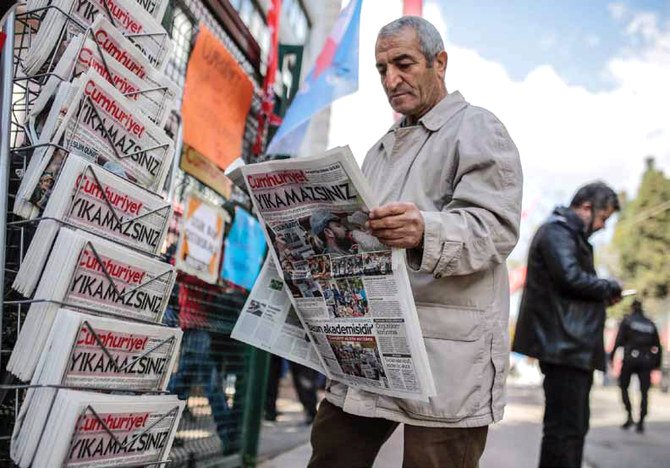
- ARAB NEWS
- 12 Jul 2025

Arab News, Ankara
Pro-government Turkish media outlets are closing since the election of a new Istanbul mayor in June, with two surprise shutdowns earlier this week.
Mayor Ekrem Imamoglu, from the secular main opposition Republican People’s Party, took the reins from President Recep Tayyip Erdogan’s ruling Justice and Development Party (AKP) which, along with its Islamist predecessors, had run the city for the last 25 years.
Newspapers published by the pro-government TurkMedya group were largely financed by Istanbul’s metropolitan municipality for decades until the city changed hands, with Imamoglu stopping their funding for impartiality reasons.
Gunes and Star, two TurkMedya newspapers, shut in a surprise decision on Monday, and pro-government outlets make up the bulk of Turkish media.
TurkMedya was said to receive about TRY10 million ($1.68 million) a month from the municipality under AKP rule, but has been facing serious financial challenges since local elections, and had to close some of its newspaper supplements.
Sarphan Uzunoglu, a media and communications specialist and editor-in-chief at the digital journalism academy NewsLabTurkey, said it was unsurprising that pro-government media outlets were experiencing financial problems.
“Massive purchases by local governments were their primary sources of income,” he told Arab News, adding that the shutdowns backed industry rumors that circulation rates were manipulated.
“If you observe the change in the daily circulation of the pro-government Star newspaper between Dec. 2019 and Dec. 2018 you can see there is no significant change, it is still around 100,000 copies per day. In other words, there is no setback that could justify such a dramatic change in the circulation rate,” he said. “Turkey's currency crisis is deeply affecting the media industry and all types of media outlets, including the ones which report higher circulation rates, suffer from high paper prices and regular costs. Advertisers do not trust the media anymore primarily due to a meltdown of trust and the lack of clarity regarding the truthfulness of circulation rates.”
Uzunoglu said most Turkish newspapers would have died without official advertisements as was the case with the independent and left-leaning newspapers Evrensel and Birgun, which announced they were experiencing hardship because income from official adverts had dried up for months.
“What is more tragic is that, despite the financial resources granted by official and corporate advertisements, pro-government media outlets cannot provide sustainability, and we will hear more news outlets going digital in the coming months due to the financial and democratic crisis of Turkey,” he said.
But he said the products from pro-government media outlets were problematic in themselves.
“These outlets do not meet the expectations of the audience and they have lost the trust of their audience. These newsrooms cannot address society as a product nor as an ideological instrument. This shows that these newsrooms, both politically and commercially, are at the end of the road.”
Orhan Sener, director of the academy at the Journalists’ Union of Turkey, said the downsizing of pro-government papers was a turning point.
“The closure of these media outlets, which have served as a propaganda instrument for the government rather than real journalism, is beneficial for the media sector and public good of the country, except for the unemployment of staff working for them,” he told Arab News.
He said that the shutdowns showed that no outlet could survive in the long-term if they proved to be inefficient and if their sole purpose was to serve as a propaganda instrument for the government.
“They have been a burden in economic and political terms. Government sources couldn’t afford to finance them after the local elections,” he added.